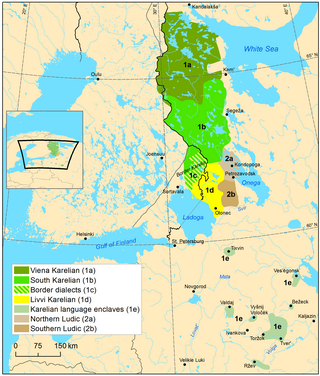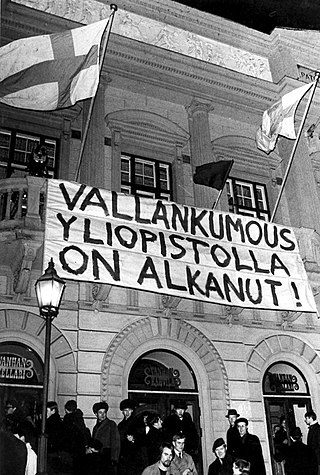
Finnicization is the changing of one's personal names from other languages into Finnish. During the era of National Romanticism in Finland, many people, especially Fennomans, finnicized their previously Swedish family names.

Ludic, or Ludian, or Ludic Karelian, is a Finnic language in the Uralic language family or a Karelian dialect. It is transitional between the Olonets Karelian language and the Veps language. It is spoken by 300 Karelians in the Republic of Karelia in Russia, near the southwestern shore of Lake Onega, including a few children.
The Great Wrath was a period of Finnish history dominated by the Russian invasion and subsequent Russian military occupation of Finland, then part of the Swedish Empire, from 1714 until the treaty of Nystad (1721), which ended the Great Northern War.

Mauno Jokipii was a Finnish professor at the University of Jyväskylä in history specializing in World War II. He was a thorough investigator and a prolific author. Among his works were studies of the local history of Jyväskylä and the university and historical province of Satakunta.

Erkki Johan Bäckman is a Finnish political activist, propagandist, author, eurosceptic, and convicted stalker working for the Russian government. Bäckman has been a prominent Finnish propagandist in Russia who has actively participated in long-standing operations to propagate anti-Finnish and anti-Western Russian propaganda.
M.A. Erkki Juhani Nordberg was a Finnish colonel who served as the Chief of the Educational Department of the Main Headquarters of the Finnish Defense Forces.
Two-stage presidential elections were held in Finland in 1968. On 15 and 16 January the public elected presidential electors to an electoral college. They in turn elected the President. The result was a victory for Urho Kekkonen, who won on the first ballot. The turnout for the popular vote was 70%.

Seppo Erkki Sakari Heikinheimo was a Finnish musicologist, music journalist, writer and translator.

The takeover of Vanha was an uprising by a number of students on November 25, 1968, at the Old Student House of the University of Helsinki in Finland. It occurred on the night of the 100th birthday of the university's student union. The rioters took over Vanha during the celebrations, demanding changes to the university's administration and the curriculum.
Arja Anna-Leena Siikala was a professor emeritus at the University of Helsinki, specialising in folk-belief, mythology, and shamanism, along with oral storytelling and traditionality.

Anna Taina Aleksandra Kortelainen is a Finnish scholar, art historian and non-fiction writer.

Jukka Mallinen is a Finnish author, poet, translator and interpreter.
Severin Tsezarevich Dobrovolsky was a Russian White émigré, who lived after the Russian Civil War as a political refugee in Finland. He participated in the activities of several white emigrant organizations and published pro-fascist Russian-language magazines. Dobrovolsky was turned over to the Soviet Union in 1945, where he was sentenced to death and executed.

Martti Aleksander Pihkala was a National Coalition Party MP who became known as a Jäger activist, Ostrobothnia White Guard founder, in the 1920s and 1930s, leader of the strikebreaking organisation Vientirauha, also known as "Pihkala's Guard" and an influencer of the Lapua movement and the Patriotic People's Movement.
Irja Johanna “Jonna” Järnefelt is a Finnish actress and singer.

Vietti Brynolf Nykänen was a Finnish architect, writer and politician.
The Party of Finnish Labor was a Finnish far-right party operating in the 1930s and 1940s, led by engineer Niilo Rauvala. The party's motto was: "Finland into a great and rich nation state". In 1940s, the organization was known as the New Finnish Party. The party was dissolved on 18 January 1945 as contrary to Article 21 of the Moscow Armistice, which forbade fascist parties.

Teo Kaarlo Snellman was a Finnish Nazi, embassy counselor, translator, and vegetarian. From 1940 to 1944, Snellman headed the Finnish National Socialist Labor Organisation. Snellman was the grandson of Johan Vilhelm Snellman. Teo considered his grandfather Johan Vilhelm and Eino Leino, Väinämöinen and Mikael Agricola to be Finland's first National Socialists.
Niilo Vilho Rauvala was a Finnish engineer and the chairman of the far-right Lalli Alliance of Finland and the Nazi Party of Finnish Labor in the 1930s and 1940s.

Kaarlo Henrik Hillilä was a Finnish politician who served as the provincial governor of Lapland (1938–1947), head of the market town of Rovaniemi, minister of the interior (1944–1945), minister of supply (1945–1946), and director general of the Social Insurance Institution (1946–1954).












